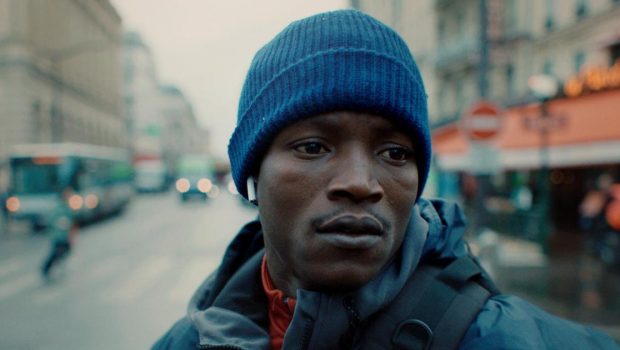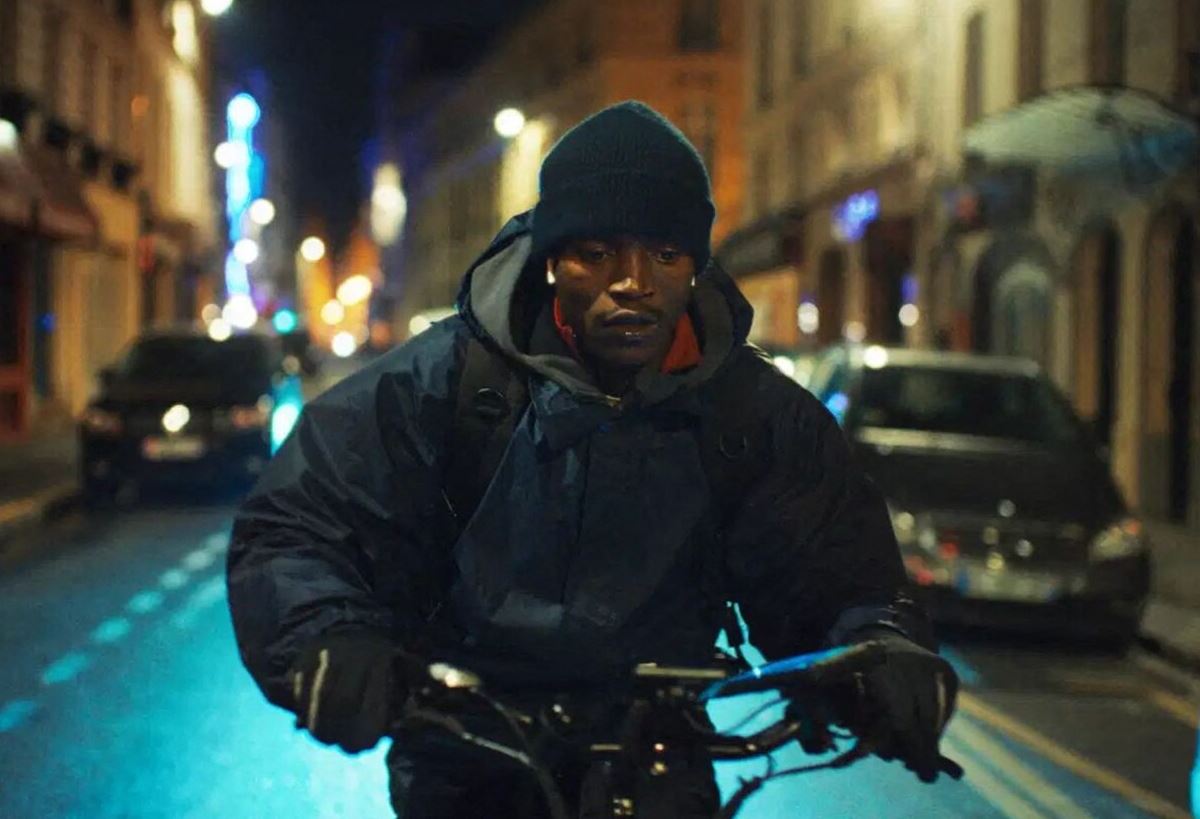The Story of Souleymane – Film Review
Reviewed by Damien Straker on the 21st of June 2025
Palace Films presents a film by Boris Lojkine
Written by Boris Lojkine and Delphine Agut
Produced by Bruno Nahon
Starring Abou Sangaré, Emmanuel Yovanie, Alpha Oumar Sow, and Nina Meurisse
Cinematography Tristan Galand
Edited by Xavier Sirven
Rating: M
Running Time: 94 minutes
Releases Date: the 26th of June 2025
This excellent French drama by filmmaker Boris Lojkine possesses the speed of a tight thriller and the visual realism of an insightful documentary. It is incredibly tense to watch Guinean asylum seekers urgently working to certify their residency in Paris. Lojkine and his casting director authenticated the story by meeting many food delivery workers and listening to the challenges they faced, including scams, relationships, and accommodation. The French Office for the Protection of Refugees and Stateless Persons (OFPRA) also allowed Lojkine to attend asylum seeker interviews and listen to the stories of real Guineans. The experience has heightened this intense social drama’s realism. Our sympathy for asylum seekers is amplified by The Story of Souleymane also becoming a gripping study of communication.
In a remarkable debut, first-time Guinean actor Abou Sangaré plays Souleymane. He is a young food deliveryman who cycles through Paris to complete his evening rounds. He needs money to purchase documents for his asylum seeker application. He looks to buy them from Barry (Alpha Oumar Sow) who provides asylum seekers with backstories so their residency can be approved. Barry is increasingly frustrated that Souleymane is short on money and is struggling to remember the key dates in his backstory. The money Souleymane earns from his deliveries enters an account owned by his friend, Emmanuel (Emmanuel Yovanie). Before his asylum interview in two days, he must contact Emmanuel, his sick mother back home, and a young Guinean woman who reveals she might marry someone else.
Some amazing technical feats ensure the film’s night-time delivery scenes are stunningly realised. Lojkine has said he filmed Sangaré while riding a bike himself. Aside from one tense moment where Souleymane suffers a minor road accident, the traffic scenes were unscripted. Lojkine filmed around real pedestrians and traffic to maximise the authenticity and capture the city’s overbearing soundscape. Equally fascinating is how many of the cycling scenes are filmed using long unbroken tracking shots. The way the camera pursues Souleymane is nerve-wracking and etched in thematic meaning. He hurries because of the desperation to certify himself as a worker and an asylum seeker. Yet the movement also reflects how he is leaving behind the personal grief he has repressed. While Lojkine’s filmic style imbues high realism, it is also critical to understanding Souleymane’s isolation.
Souleymane is sympathetic to hardworking asylum seekers, but the deeper themes surprise us. The climax is not defined by the rejection or approval of Souleymane’s application. It is about whether he can communicate to an OFPRA agent (Nina Meurisse) what happened in Guinea. In this scene, Souleymane is filmed in mid-shots, which is expressive of subjective cinema. The drama is viewed from his perspective and hinges on him describing his journey to France. Communication is thematically persistent. Souleymane struggles to remember the story Barry has given him. At work, he clashes with a restaurant owner and later a woman who won’t accept her delivery. He loses touch with Emmanuel when the account closes. The food delivery system underlines how our overreliance on technology isolates us. Rather than reemphasising the challenges asylum seekers face, the film dramatises people in the same community struggling to communicate with each other and being open with themselves.
In each scene, Guinean actor Abou Sangaré plays Souleymane with soul and urgency. Before filming, he worked as a real delivery person to familiarise himself with the job’s rituals. His preparation accounts for the film’s verisimilitude. The banter shared with his friends and colleagues is also natural and unforced. Furthermore, the different facets of Souleymane’s personality make Sangaré’s performance impressive. There are delicate, humanised moments, such as when he helps an elderly man with his delivery or speaks to the young Guinean woman on the phone. In the climactic interview, he visibly wrestles with himself about telling his real family story. Sangaré shines because he embodies the difficulty of communicating grief and our resistance to harsh realities. Those playing his contacts, including Alpha Oumar Sow and Emmanuel Yovanie, also heighten the tension levels.
Lojkine’s film is artful and thematically richer than expected. The authenticity and realism immerse us in the speed of Sangaré’s work and determination to be certified. The film also dramatises the digital age where technology suppresses people’s ability to openly communicate. Rather than reiterating what most sensibly agree upon, the need to process legitimate asylum seekers, the story’s moral dilemma is more complex. Is a man ready to concede he has unresolved personal conflict at home? Ultimately, Souleymane is effective in showing both the speed of the gig economy and repressed grief in the digital age.
Summary: Souleymane is effective in showing both the speed of the gig economy and repressed grief in the digital age.








